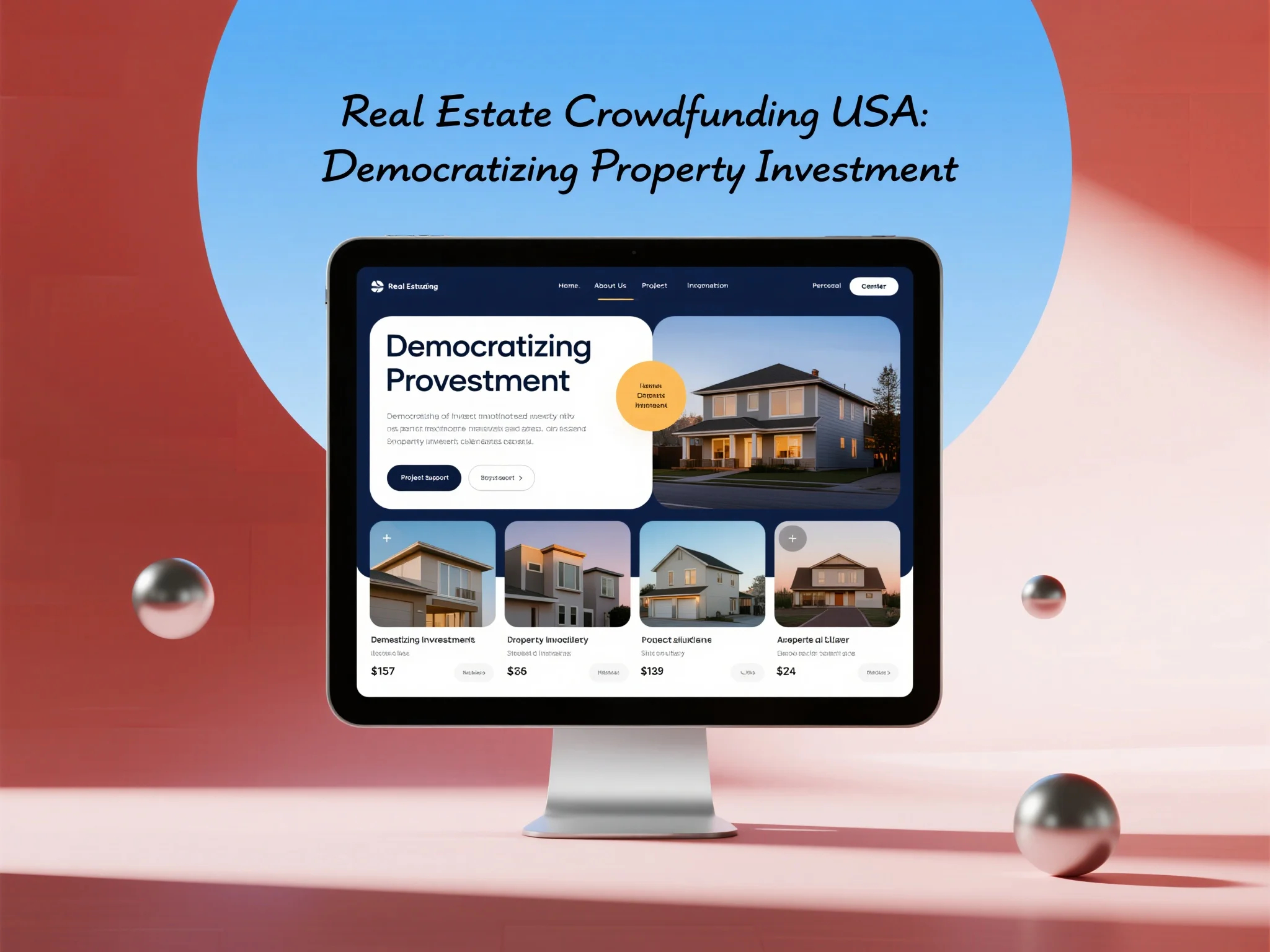Understanding Real Estate Crowdfunding Fundamentals in the United States The revolutionary concept of real estate crowdfunding USA has fundamentally transformed the investment landscape by democratizing access to real estate opportunities that were previously available only to institutional investors and high-net-worth individuals, creating new pathways for retail investors to participate in commercial and residential real estate markets across the United States. Real estate crowdfunding platforms leverage technology to connect individual investors with real estate developers and sponsors, enabling fractional ownership of properties and real estate projects through
online investment platforms that provide transparency, accessibility, and professional management of real estate investments. The regulatory framework governing real estate crowdfunding in the United States includes compliance with Securities and Exchange Commission regulations, state securities laws, and investor accreditation requirements that vary depending on the specific crowdfunding structure and investment offering. Investment opportunities through real estate crowdfunding platforms encompass a diverse range of property types including commercial office buildings, retail centers, industrial facilities, multifamily residential properties, and specialized real estate sectors that provide investors with exposure to different market segments and risk profiles. The due diligence process for real estate crowdfunding investments requires careful evaluation of platform credibility, sponsor track records, property fundamentals, market conditions, and investment terms to ensure alignment with investor objectives and risk tolerance levels. Technology integration in real estate crowdfunding platforms provides investors with enhanced transparency through detailed property information, financial projections, progress updates, and performance reporting that enable informed investment decisions and ongoing monitoring of investment performance. The minimum investment requirements for real estate crowdfunding opportunities typically range from $1,000 to $25,000, making real estate investment accessible to a broader range of investors compared to traditional direct real estate ownership or institutional real estate funds.Private Real Estate Fund Structures and Investment Access The sophisticated investment vehicle of private real estate funds represents a cornerstone of institutional real estate investing that is increasingly accessible through crowdfunding platforms, providing individual investors with exposure to professionally managed real estate portfolios and institutional-quality investment strategies. Private real estate funds typically focus on specific investment strategies such as value-add acquisitions, development projects, distressed property investments, or core income-producing assets that require substantial capital commitments and professional asset management expertise. The structure of private real estate funds often
involves limited partnership arrangements where the fund sponsor serves as the general partner responsible for investment decisions and asset management, while investors participate as limited partners with defined rights, responsibilities, and return expectations. Investment access to private real estate funds through crowdfunding platforms has expanded opportunities for accredited investors to participate in institutional-quality real estate investments with lower minimum investment requirements compared to traditional private fund structures. The performance characteristics of private real estate funds typically include current income distributions, capital appreciation potential, and portfolio diversification benefits that can enhance overall investment portfolio risk-adjusted returns over extended investment periods. Due diligence for private real estate fund investments requires comprehensive analysis of fund sponsor experience, investment strategy, target markets, fee structures, and historical performance to evaluate the likelihood of achieving projected investment returns. The liquidity characteristics of private real estate funds generally involve longer investment holding periods compared to publicly traded real estate securities, with typical fund terms ranging from five to ten years depending on the specific investment strategy and market conditions. Risk management for private real estate fund investments includes understanding sponsor risk, market risk, liquidity constraints, and the potential for capital calls that may require additional investor commitments during the investment period.Vacation Rental Investment Opportunities and Market Dynamics
The expanding market for vacation rental investment USA has created compelling opportunities for real estate crowdfunding participants to access short-term rental properties in popular vacation destinations across the United States, benefiting from growing demand for alternative accommodation options and the sharing economy trend. Vacation rental properties in prime locations such as beach communities, mountain resorts, urban destinations, and recreational areas have demonstrated strong revenue potential through platforms like Airbnb, VRBO, and other short-term rental marketplaces that connect property owners with travelers seeking unique accommodation experiences. The investment fundamentals for vacation rental properties include factors such as location desirability, seasonal demand patterns, local regulations governing short-term rentals, property management requirements, and revenue optimization strategies that can significantly impact investment returns and operational complexity. Market analysis for vacation rental investments requires understanding of tourism trends, local economic conditions, competitive supply, and regulatory environment that can affect occupancy rates, average daily rates, and overall property performance in specific vacation rental markets. The operational aspects of vacation rental investments include property management, guest services, marketing, maintenance, and compliance with local regulations that may require professional management services or significant owner involvement depending on the investment structure and location. Technology platforms supporting vacation rental investments provide tools for revenue management, guest communication, property maintenance coordination, and performance tracking that can enhance operational efficiency and investment returns for vacation rental property owners. The financing considerations for vacation rental investments often involve higher down payment requirements, different lending criteria, and potential restrictions on short-term rental financing that investors must consider when evaluating investment opportunities and structuring acquisitions. Risk management for vacation rental investments includes understanding market volatility, regulatory changes, seasonal fluctuations, and property management challenges that can impact cash flow generation and long-term investment performance in the vacation rental sector.
Student Housing Investment Strategies and Market Fundamentals
The specialized real estate sector of student housing investment offers unique opportunities for crowdfunding investors to participate in purpose-built student accommodation projects that serve the growing demand for quality housing near colleges and universities across the United States. Student housing properties typically feature specialized designs and amenities that cater to student preferences including furnished units, study areas, recreational facilities, and technology infrastructure that enhance the student living experience and support premium rental rates. The investment characteristics of student housing include predictable demand patterns driven by enrollment trends, lease structures that often include parental guarantees, and the potential for annual rent increases that can provide stable cash flow and inflation protection for investors. Market fundamentals for student housing investment require analysis of university enrollment trends, campus housing capacity, local market competition, and demographic factors that influence student housing demand in specific university markets across the United States. The development and acquisition strategies for student housing investments often focus on properties located within walking distance or convenient transportation access to major universities, with emphasis on modern amenities and services that attract students and support occupancy rates. Property management for student housing investments involves specialized expertise in marketing to student populations, lease administration, maintenance coordination, and compliance with regulations governing student housing that may differ from traditional residential rental properties. The financing landscape for student housing investments includes specialized lenders and investment structures that understand the unique characteristics of student housing properties and can provide appropriate capital solutions for acquisition and development projects. Risk management for student housing investments includes understanding enrollment volatility, competition from university-owned housing, regulatory changes affecting student housing, and the potential for economic factors that could impact student enrollment and housing demand in specific markets.

Multi-Family Property Investment Through Crowdfunding Platforms
The cornerstone investment category of multi-family property investment represents one of the most popular and accessible real estate investment opportunities available through crowdfunding platforms, providing investors with exposure to apartment buildings, condominium projects, and residential communities that generate stable rental income and long-term appreciation potential. Multi-family properties offer several advantages for real estate investors including economies of scale in property management, diversified tenant base that reduces vacancy risk, and the potential for value enhancement through property improvements, operational efficiencies, and market appreciation. The investment strategies for multi-family properties through crowdfunding platforms encompass various approaches including value-add acquisitions that involve property improvements and repositioning, core investments in stabilized properties generating current income, and development projects that create new multi-family housing supply in growing markets. Market analysis for multi-family property investments requires evaluation of local rental market conditions, population growth trends, employment patterns, and housing supply dynamics that influence rental rates, occupancy levels, and property values in specific metropolitan areas. The underwriting process for multi-family property investments involves comprehensive analysis of property condition, rental roll analysis, operating expense evaluation, capital improvement requirements, and market positioning to determine appropriate acquisition pricing and return projections. Property management for multi-family investments requires specialized expertise in tenant relations, lease administration, maintenance coordination, and regulatory compliance that can significantly impact property performance and investor returns over the investment holding period. The financing structures for multi-family property investments often involve leverage that can enhance returns while introducing additional risk, with typical loan-to-value ratios ranging from 70% to 80% depending on property type, location, and borrower qualifications. Performance measurement for multi-family property investments includes metrics such as cash-on-cash returns, internal rates of return, occupancy rates, and net operating income growth that provide insights into investment performance and portfolio contribution.
Technology Innovation and Platform Development in Real Estate Crowdfunding
The technological advancement driving real estate crowdfunding platforms continues to enhance investor experience, transparency, and access to real estate investment opportunities through innovative features including virtual property tours, automated investment processes, real-time performance reporting, and sophisticated risk assessment tools. Platform development in real estate crowdfunding focuses on creating user-friendly interfaces that simplify the investment process while providing comprehensive information about investment opportunities, sponsor backgrounds, property details, and market analysis that enable informed investment decisions. The integration of artificial intelligence and machine learning technologies in real estate crowdfunding platforms is improving investment selection processes, risk assessment capabilities, and personalized investment recommendations that can help investors identify opportunities aligned with their investment objectives and risk preferences. Blockchain technology and digital securities are emerging as potential innovations in real estate crowdfunding that could enhance transaction efficiency, reduce costs, and provide enhanced liquidity options for real estate investments through tokenization and secondary market development. The regulatory technology solutions implemented by crowdfunding platforms ensure compliance with securities regulations, investor accreditation verification, and anti-money laundering requirements while streamlining the investment process and maintaining regulatory compliance across multiple jurisdictions. Data analytics and market intelligence capabilities of modern crowdfunding platforms provide investors with enhanced market insights, comparative analysis tools, and performance benchmarking that can improve investment decision-making and portfolio management strategies. The mobile technology integration in real estate crowdfunding platforms enables investors to access investment opportunities, monitor portfolio performance, and receive updates on their investments through smartphone applications that provide convenience and real-time connectivity. Cybersecurity measures and data protection protocols implemented by reputable crowdfunding platforms protect investor information, financial data, and transaction security through advanced encryption, secure authentication, and comprehensive security monitoring systems.
Regulatory Environment and Investor Protection Measures
The regulatory framework governing real estate crowdfunding in the United States includes comprehensive securities laws, investor protection measures, and platform oversight requirements that ensure transparency, fairness, and appropriate risk disclosure for retail investors participating in real estate crowdfunding opportunities. The Securities and Exchange Commission regulations applicable to real estate crowdfunding include Rules 506(b) and 506(c) under Regulation D, which govern private placement offerings and establish requirements for investor accreditation, disclosure, and solicitation restrictions that crowdfunding platforms must follow. State securities regulations add additional compliance requirements for real estate crowdfunding platforms operating across multiple states, including registration requirements, notice filings, and coordination with state securities regulators to ensure compliance with applicable blue sky laws. Investor protection measures in real estate crowdfunding include mandatory disclosure documents, risk factor identification, financial statement requirements, and ongoing reporting obligations that provide investors with essential information for making informed investment decisions and monitoring investment performance. The accredited investor requirements for many real estate crowdfunding opportunities limit participation to individuals meeting specific income or net worth thresholds, though some platforms offer opportunities for non-accredited investors under Regulation Crowdfunding with lower investment limits and additional investor protections. Due diligence standards for real estate crowdfunding platforms include verification of sponsor qualifications, property valuations, market analysis, and financial projections that help ensure the quality and accuracy of investment opportunities presented to investors. The fiduciary responsibilities of crowdfunding platform operators include acting in the best interests of investors, maintaining appropriate conflicts of interest policies, and providing fair and balanced presentation of investment opportunities and associated risks. Ongoing regulatory developments in real estate crowdfunding may include enhanced disclosure requirements, platform oversight measures, and investor protection enhancements that could impact the structure and operation of crowdfunding platforms and investment opportunities.
Investment Performance Analysis and Portfolio Integration Strategies
The comprehensive evaluation of investment performance in real estate crowdfunding requires sophisticated analysis of returns, risk metrics, and portfolio contribution factors that help investors assess the effectiveness of their real estate crowdfunding investments and optimize their overall investment strategies. Performance measurement for real estate crowdfunding investments includes analysis of cash flow generation, capital appreciation, total returns, and risk-adjusted performance metrics that provide insights into investment success and areas for portfolio improvement or rebalancing. The portfolio integration strategies for real estate crowdfunding investments involve consideration of asset allocation, diversification benefits, correlation with other asset classes, and the role of real estate in overall wealth building and risk management objectives. Benchmarking real estate crowdfunding performance against traditional real estate investment alternatives such as REITs, direct property ownership, and institutional real estate funds helps investors evaluate the relative attractiveness and performance characteristics of crowdfunding investments. The tax implications of real estate crowdfunding investments include considerations for passive income treatment, depreciation benefits, and potential for tax-advantaged structures that can enhance after-tax returns and overall investment efficiency for tax-conscious investors. Risk assessment for real estate crowdfunding portfolios involves evaluation of concentration risk, liquidity risk, sponsor risk, and market risk factors that could impact investment performance and require appropriate diversification and risk management strategies. The exit strategies and liquidity considerations for real estate crowdfunding investments vary significantly among platforms and investment structures, with some offering secondary market opportunities while others require holding investments until project completion or fund liquidation. Future trends in real estate crowdfunding performance may be influenced by market conditions, regulatory changes, technology innovations, and evolving investor preferences that could create new opportunities and challenges for real estate crowdfunding participants and platform operators.




